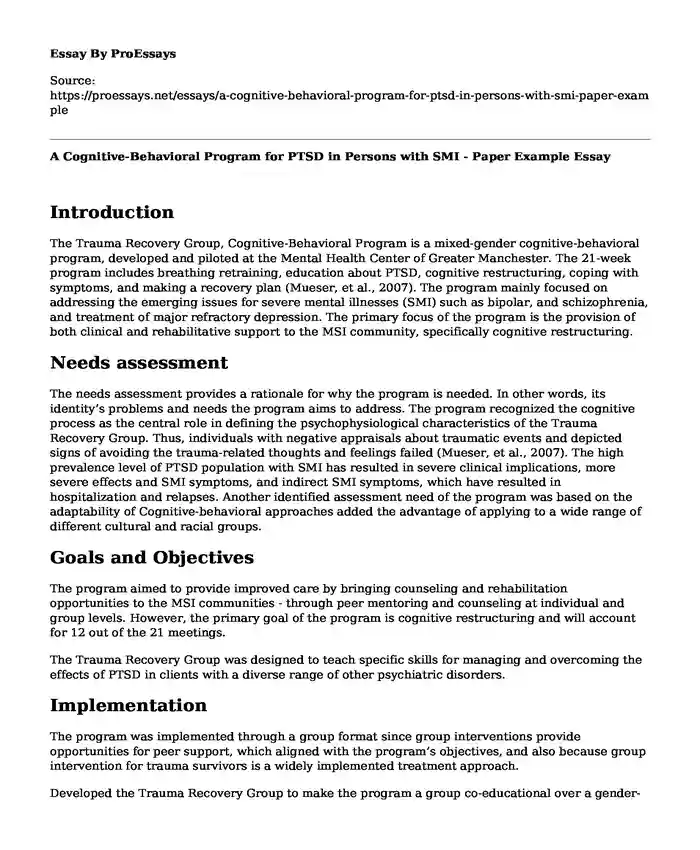Introduction
The Trauma Recovery Group, Cognitive-Behavioral Program is a mixed-gender cognitive-behavioral program, developed and piloted at the Mental Health Center of Greater Manchester. The 21-week program includes breathing retraining, education about PTSD, cognitive restructuring, coping with symptoms, and making a recovery plan (Mueser, et al., 2007). The program mainly focused on addressing the emerging issues for severe mental illnesses (SMI) such as bipolar, and schizophrenia, and treatment of major refractory depression. The primary focus of the program is the provision of both clinical and rehabilitative support to the MSI community, specifically cognitive restructuring.
Needs assessment
The needs assessment provides a rationale for why the program is needed. In other words, its identity’s problems and needs the program aims to address. The program recognized the cognitive process as the central role in defining the psychophysiological characteristics of the Trauma Recovery Group. Thus, individuals with negative appraisals about traumatic events and depicted signs of avoiding the trauma-related thoughts and feelings failed (Mueser, et al., 2007). The high prevalence level of PTSD population with SMI has resulted in severe clinical implications, more severe effects and SMI symptoms, and indirect SMI symptoms, which have resulted in hospitalization and relapses. Another identified assessment need of the program was based on the adaptability of Cognitive-behavioral approaches added the advantage of applying to a wide range of different cultural and racial groups.
Goals and Objectives
The program aimed to provide improved care by bringing counseling and rehabilitation opportunities to the MSI communities - through peer mentoring and counseling at individual and group levels. However, the primary goal of the program is cognitive restructuring and will account for 12 out of the 21 meetings.
The Trauma Recovery Group was designed to teach specific skills for managing and overcoming the effects of PTSD in clients with a diverse range of other psychiatric disorders.
Implementation
The program was implemented through a group format since group interventions provide opportunities for peer support, which aligned with the program’s objectives, and also because group intervention for trauma survivors is a widely implemented treatment approach.
Developed the Trauma Recovery Group to make the program a group co-educational over a gender-based approach mainly because the primary therapeutic technique used in the program was cognitive restructuring and not exposure model.
Evaluation
Evaluation criteria of the program were based on 1) clients with SMI engagement success and retention in the group. 2) is participation in the group associated with improvements in PTSD, depression, and trauma-related beliefs? (Mueser, et al., 2007). The patients provided information regarding their trauma exposure, symptoms, knowledge, and trauma-related recognition of PTSD and SMI before the beginning and at the end of the program.
Conclusion
In conclusion, out of the 41 clients who provided follow-up data, eight patients were assessed at baseline. This outcome provided good group retention of 59%. The program also registered improved treatment completers in PTSD symptoms, diagnosis, cognitions, and knowledge compared to dropouts. The outcome of the program thus supported its feasibility.
References
Mueser, K. T., Bolton, E., Carty, P. C., Bradley, M. J., Ahlgren, K. F., DiStaso, D. R., . . . Liddell, C. (2007). The Trauma Recovery Group: A Cognitive-Behavioral Program for Post-Traumatic Stress Disorder in Persons with Severe Mental Illness. Community Mental Health Journal, 281-304. Retrieved from https://doi.org/10.1007/s10597-006-9075-2. https://doi.org/10.1007/s10597-006-9075-2
Cite this page
A Cognitive-Behavioral Program for PTSD in Persons with SMI - Paper Example. (2023, Dec 28). Retrieved from https://proessays.net/essays/a-cognitive-behavioral-program-for-ptsd-in-persons-with-smi-paper-example
If you are the original author of this essay and no longer wish to have it published on the ProEssays website, please click below to request its removal:
- Oppositional Defiant Disorder Trauma in Foster Children
- Psychological Impacts of Disaster Essay Example
- Essay Sample on The Ideal Love
- Student's Self-Assessments Paper Example
- Essay Sample on Overwhelming Stress: Causes and Effects
- Paper Example on Stress & Its Consequences: The SRRS & GAS
- Caring for Older Adults - Free Essay Example







